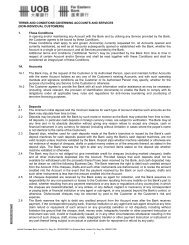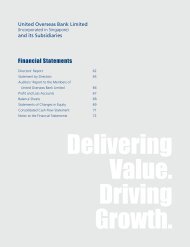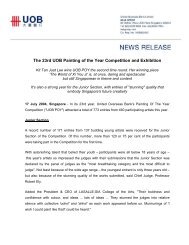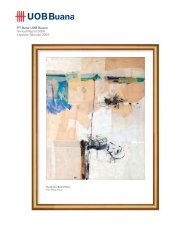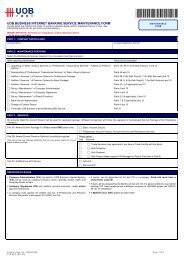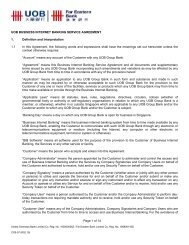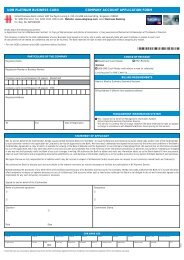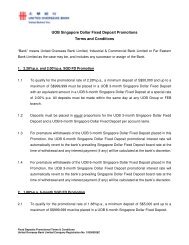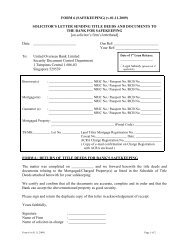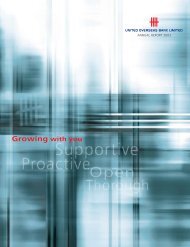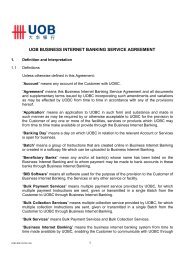Notes to the Financial Statements for the financial year ended 31 December <strong>2002</strong> 43 Non-Current Assets and Liabilities To comply with the disclosure requirements of the Ninth Schedule of the Singapore Companies Act, set out below are the noncurrent assets and non-current liabilities of the Group and the <strong>Bank</strong>. Assets and liabilities other than those disclosed below are current. The Group The <strong>Bank</strong> <strong>2002</strong> 2001 <strong>2002</strong> 2001 $'000 $'000 $'000 $'000 Non-Current Assets Singapore Government treasury bills and securities 568,803 552,957 568,803 552,957 Trade bills and advances to customers (gross) 32,944,833 36,487,701 28,674,127 13,296,229 Placements and balances with banks and agents 229,129 157,229 229,129 80,354 Investment securities 3,945,383 3,431,062 2,687,019 989,656 Investments in associates 1,274,245 1,781,322 706,868 737,601 Investments in subsidiaries – – 1,409,829 10,260,598 Fixed assets 1,794,349 1,724,515 1,118,922 610,132 Deferred tax assets 39,519 29,218 2,790 14,033 Goodwill 3,666,046 3,776,651 3,585,428 – 44,462,307 47,940,655 38,982,915 26,541,560 Non-Current Liabilities Deposits of and amounts owing to non-bank customers, banks and agents, and subsidiaries 897,142 537,294 756,159 201,932 Deferred tax liabilities 26,900 23,539 6,422 874 Debts issued 1,294,399 3,639,095 1,294,399 3,639,095 2,218,441 4,199,928 2,056,980 3,841,901 44 Financial Risk Management The Group’s activities are principally related to transacting in and the use of financial instruments, including derivatives. Transactions in, and the use of, financial instruments expose the Group to a variety of financial risks, mainly credit risk, foreign exchange risk, interest rate risk and liquidity risk. Managing financial risks is an integral part of the Group’s business and it is carried out centrally by the various specialist committees of the <strong>UOB</strong> Group under policies approved by the directors of the <strong>Bank</strong>. These policies not only include the parameters for the risks that the Group may undertake for the various financial instruments, but also directions on the types of business that the Group may engage in, guidelines for accepting customers for all types of financial instruments and the terms under which customer business is conducted. The various specialist committees of the <strong>UOB</strong> Group have established processes to identify, measure, monitor and ultimately, mitigate these financial risks. Additionally, the Board of Directors of the <strong>Bank</strong> and the <strong>UOB</strong> Group’s Risk Management & Compliance Sector provide an independent oversight to ensure that those risk management policies are complied with through a variety of established controls and reporting processes. 146
Discussions on the main financial risks that the Group is exposed to and how it manages these risks are set out below. (a) Credit Risk Credit risk is the potential loss arising from any failure by the Group’s customers or counter-parties to fulfil their obligations as and when these obligations fall due. These obligations may arise from lending, trade finance, investments, receivables under derivative contracts and other credit-related activities undertaken by the Group. The Credit Committee is responsible for the management of credit risk of the Group. Apart from direct credit management, such as approval of significant loans, it is also responsible for providing directions and timely guidance on lending to different geographical sectors, industries and products. In general, the Group monitors the levels of credit risk it undertakes through regular review by management, with independent oversight of its credit concentration and portfolio quality by the Credit Committee. In respect of its lending-related activities, management regularly reviews the amount of risk accepted in relation to one borrower or groups of borrowers, geographical and industry segments, types of acceptable security, level of non-performing loans and adequacy of provisioning requirements. In respect of other credit risk activities such as money market transactions and derivative financial instruments, the Group has counter-party risk policies that set out approved counter-parties with whom the Group may transact and their respective transaction limits. Exposure to credit risk is also managed in part by obtaining collateral or right to call for collateral when certain exposure thresholds are exceeded, the right to terminate transactions upon the occurrence of unfavourable events, the right to reset the terms of transactions after specified time periods or upon the occurrence of unfavourable events, and entering into netting agreements with counter-parties that permit the Group to offset receivables and payables with such counter-parties. Given the amounts, types and nature of its existing products and businesses, the Group assesses that industry concentration risk arises primarily from the Group’s trade bills and advances to customers. Note 28(c) analyses the Group’s total gross trade bills and advances to customers by industry classification as at the balance sheet date. UNITED OVERSEAS BANK 147
- Page 1 and 2:
ANNUAL REPORT 2002 United for Growt
- Page 3 and 4:
Our Mission To be a premier bank in
- Page 5 and 6:
Performance in Brief Profit For The
- Page 7 and 8:
Profit growth was derived mainly fr
- Page 9 and 10:
Financial Highlights Group Assets 2
- Page 11 and 12:
Group Return On Average Shareholder
- Page 13 and 14:
Corporate Information Honorary Life
- Page 15 and 16:
Left to right: Koh Beng Seng, Ngiam
- Page 17 and 18:
Left to right: Tan Kok Quan, Prof L
- Page 19 and 20:
Mr Francis Lee Chin Yong Managing D
- Page 21 and 22:
The Bank has a budget for directors
- Page 23 and 24:
independent and non-executive direc
- Page 25 and 26:
work of each of the banking subsidi
- Page 27 and 28:
Risk Management Credit and Country
- Page 29 and 30:
The composition of loans and advanc
- Page 31 and 32:
Group Non-Performing Loans (NPLs) a
- Page 33 and 34:
Group NPLs and Cumulative Provision
- Page 35 and 36:
Group Specific Provision by Region
- Page 37 and 38:
Collateral Types The majority of th
- Page 39 and 40:
Exposure to the Five Regional Count
- Page 41 and 42:
Cross-Border Exposure to the Five R
- Page 43 and 44:
Complementing the static analysis i
- Page 45 and 46:
Sources of Deposits The Group has a
- Page 47 and 48:
The VaR calculations are performed
- Page 49 and 50:
Group Daily VaR Distribution for 20
- Page 51 and 52:
As part of the Group's comprehensiv
- Page 53 and 54:
The celebratory light-up linking UO
- Page 55 and 56:
services so as to meet the increasi
- Page 57 and 58:
Our subsidiary, UOB Asset Managemen
- Page 59 and 60:
Grow our services In line with the
- Page 61 and 62:
exercise, achieved well ahead of th
- Page 63 and 64:
processes in place that will suppor
- Page 65 and 66:
Group Financial Review Review of Fi
- Page 67 and 68:
Group Profits The Group achieved a
- Page 69 and 70:
Analysis of Changes in Net Interest
- Page 71 and 72:
Cost Savings from Integration The G
- Page 73 and 74:
Overview of Balance Sheet Assets Mi
- Page 75 and 76:
Gross Customer Loans Analysed by Cu
- Page 77 and 78:
Capital Adequacy Ratios The Capital
- Page 79 and 80:
Directors’ Report for the financi
- Page 81 and 82:
In addition, the following subsidia
- Page 83 and 84:
Arrangements to Enable Directors to
- Page 85 and 86:
Ability to Meet Obligations No cont
- Page 87 and 88:
Share Options of the Bank (a) From
- Page 89 and 90:
(d) (e) (f) No options have been gr
- Page 91 and 92:
Statement by Directors for the fina
- Page 93 and 94:
Income Statements for the financial
- Page 95 and 96:
The Group The Bank Note 2002 2001 2
- Page 97 and 98: The Group 2001 Non- Share of Share
- Page 99 and 100: The Bank 2001 Non- Share Share Dist
- Page 101 and 102: Notes to the Financial Statements f
- Page 103 and 104: (e) Investments (i) Singapore Gover
- Page 105 and 106: (k) Derivative Financial Instrument
- Page 107 and 108: 4 Interest Expense The Group The Ba
- Page 109 and 110: (c) Equity Compensation Benefits Op
- Page 111 and 112: 11 Directors’ Fees and Other Remu
- Page 113 and 114: 14 Tax (a) The tax charge to the in
- Page 115 and 116: 2002 2001 Fair Value of Depreciable
- Page 117 and 118: Deferred tax assets and liabilities
- Page 119 and 120: 18 Non-Distributable Reserves (a) T
- Page 121 and 122: 19 Revenue Reserves (a) The Group 2
- Page 123 and 124: (c) The interim dividend paid in sp
- Page 125 and 126: 23 Debts Issued The Group The Bank
- Page 127 and 128: (b) Included in other government tr
- Page 129 and 130: (c) Total gross trade bills and adv
- Page 131 and 132: 29 Other Assets The Group The Bank
- Page 133 and 134: 32 Investments in Subsidiaries (a)
- Page 135 and 136: 33 Movements in the Provisions for
- Page 137 and 138: 34 Fixed Assets (a) The Group 2002
- Page 139 and 140: (e) Certain freehold and leasehold
- Page 141 and 142: 39 Derivative Financial Instruments
- Page 143 and 144: (c) Derivative financial instrument
- Page 145 and 146: The Group - 2001 Individual Institu
- Page 147: (b) Secondary Reporting Format - Ge
- Page 151 and 152: The Group - 2002 Hong Singapore US
- Page 153 and 154: Other foreign exchange exposures of
- Page 155 and 156: The Group - 2002 Non- Over 7 Over O
- Page 157 and 158: The Group - 2001 Non- Over 7 Over O
- Page 159 and 160: The Group - 2002 Over 7 Over Over O
- Page 161 and 162: The Group - 2001 Over 7 Over Over O
- Page 163 and 164: Where quoted and observable market
- Page 165 and 166: Percentage of Paid-Up Capital Held
- Page 167 and 168: Percentage of Paid-Up Capital Held
- Page 169 and 170: Percentage of Paid-Up Capital Held
- Page 171 and 172: Investor Reference Financial Highli
- Page 173 and 174: 1998 1997 1996 1995 1994 1993 1992
- Page 175 and 176: 1998 1997 1996 1995 1994 1993 1992
- Page 177 and 178: Statistics of Shareholdings as at 1
- Page 179 and 180: Changes in Share Capital The follow
- Page 181 and 182: Our International Network Banking S
- Page 183 and 184: United Overseas Bank (Malaysia) Bhd
- Page 185 and 186: UOB Venture Management (Shanghai) C
- Page 187 and 188: Notes to Resolutions 4, 6, 7, 8, 9,
- Page 189: Notes: 1 Please insert the number o




